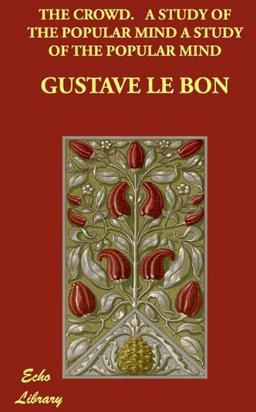

Most ebook files are in PDF format, so you can easily read them using various software such as Foxit Reader or directly on the Google Chrome browser.
Some ebook files are released by publishers in other formats such as .awz, .mobi, .epub, .fb2, etc. You may need to install specific software to read these formats on mobile/PC, such as Calibre.
Please read the tutorial at this link: https://ebookbell.com/faq
We offer FREE conversion to the popular formats you request; however, this may take some time. Therefore, right after payment, please email us, and we will try to provide the service as quickly as possible.
For some exceptional file formats or broken links (if any), please refrain from opening any disputes. Instead, email us first, and we will try to assist within a maximum of 6 hours.
EbookBell Team

5.0
80 reviewsThe Crowd: A Study of the Popular Mind, by French social theorist Gustave Le Bon, is a short treatise written in 1895 on the principles of large gatherings of people. As the disclaimer on the title page notes, the ideas in Le Bon's book were popular at the time of the late 19th century but are no longer in vogue today. The reasons for this are obvious, as LeBon unpretentiously puts to fault all the rhetoric about "democracy," "equality," "fraternity," and "equality" as being mere catchphrases that self-serving demagogues use to control the spirit of the masses. He cites the French Revolution and the demands of Socialism and Communism during his time.
Le Bon outlines the way crowds tend to think (in vivid images illogically connected), how they reason (they don't for all practical purposes), how they express exaggerated emotion, how they are very quick to take action without coherent thought and of the general extreme-conservatism and intolerance of crowds. The individual who becomes part of a crowd tends to loose himself, and feels invincible as he is aware of the similarity of mind and purpose of all those surrounding him.
In the book, Le Bon claims that there are several characteristics of crowd psychology: "impulsiveness, irritability, incapacity to reason, the absence of judgement of the critical spirit, the exaggeration of sentiments, and others..." Le Bon claimed that "an individual immersed for some length of time in a crowd soon finds himself – either in consequence of magnetic influence given out by the crowd or from some other cause of which we are ignorant – in a special state, which much resembles the state of fascination in which the hypnotized individual finds himself in the hands of the hypnotizer."
Le Bon notes how individuals become unthinking entities of the Herd, and can be unconsciously made to do acts, which can either be of great criminality or heroism. The reasoning of the solitary individual is superior to that of a crowd which has no individuality. All are "equal" in a crowd where, for instance, a mathematician is caught up in the same spirit as a laborer and class and intelligence differences fall to the lowest common denominator.
One advantage of crowds is that they can express the spirit of a class, caste, or race of a people better than the individual can, and that crowds are capable of great deeds such as victory in a war or the spread of a religion that would be beyond simply one person's effort.
Hitler, Mussolini in addition to Freud, were familiar with LeBon's work, and it is readily apparent that their followers acted very similar to the behavior that LeBon describes.
Table of contents
Introduction: The Era of the Crowds.
Book I: The Mind of Crowds
Chapter I: General Characteristics of Crowds—Psychological Law of Their Mental Unity
Chapter II: The Sentiments and Morality of Crowds
Chapter III: The Ideas, Reasoning Power, and Imagination of Crowds
Chapter IV: A Religious Shape Assumed By All the Convictions of Crowds
Book II: The Opinions and Beliefs of Crowds
Chapter I: Remote Factors of the Opinions and Beliefs of Crowds
Chapter II: The Immediate Factors of the Opinions of Crowds
Chapter III: The Leaders of Crowds and Their Means of Persuasion
Chapter IV: Limitations of the Variability of the Beliefs and Opinions of Crowds
Book III: The Classification and Description of the Different Kinds of Crowds
Chapter I: The Classification of Crowds
Chapter II: Crowds Termed Criminal Crowds
Chapter III: Criminal Juries
Chapter IV: Electoral Crowds
Chapter V: Parliamentary Assemblies